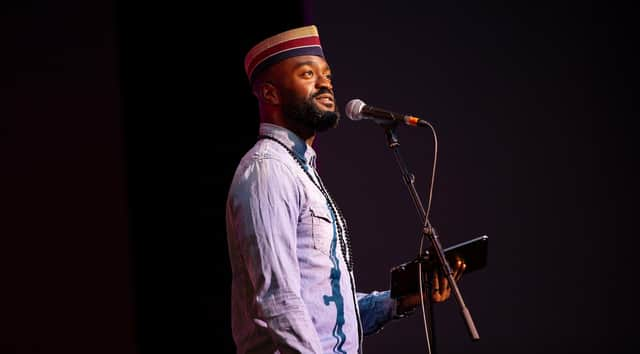EIF review: A Toast to the People


The first three events followed a defined structure, allowing each of the artists half an hour to perform a set of their own choosing around their toast, with a 15-minute talk led by poet and writer Nadine Aisha Jassat at the end. Jassat introduced the performances as being themed around the concept of ‘emergence’; presumably from the state of enforced hibernation which society has had to endure lately, as a number of those experienced artists appearing were anything but emerging in their careers.
On Monday, Jay Bernard and Debris Stevenson appeared, the latter a replacement for the billed Jefferson Tshabalala. Both complemented each other well, as young writers and performers from London or thereabouts (“the seam between East London and Essex,” reads Stevenson’s biography) whose work explores, among other things, queerness and music.
Advertisement
Hide AdBernard, self-described as a female-to-male transexual, hit an early crescendo for the evening with an epic exploration of their own identity which began with the shaming spark of a street fight in Berlin, in which they and a friend were randomly attacked by a man, and they fought back against him – in what they now recognise was one of those ugly, aggressive moments of performative macho anger.
Yet the incident has brought a beautiful work, in which Bernard coasts through the meaning of the full stop in literature and life, their own connection to masculinity (“I wanted Lynx Africa to be marketed to me!” they plead at one point), and what feels like the inevitability and futility of violence, wrapped in the same thought.
They toasted Linton Kwesi Johnson with England Street (Reggae fi Linton), a powerful, lyrical evocation of the literary and racial history of Brixton which made past and present feel alive all at once. Stevenson – a “dyslexic, academic grime poet” – spread the toasts around, meanwhile; to her friends, her late grandmother, her own neurodivergence, and her “homophobic parents”, who were not accepting of her own sexuality.
In Toast to Room Two, she toasted her brother Gary, a former star city trader turned champion of discussion around wealth inequality, comparing his success to the entrepreneurialism surrounding the grime scene she emerged from, and his thinking differently to the energy which emerges in the second room at a house party.
On Tuesday there were two poets who couldn’t have been more different, even though Inua Ellams (a Fringe First winner for his 2009 solo show The 14th Tale) seemed somewhat starstruck by the presence of Saul Williams. Ellams himself was bright and cheerful, the sense of place and of personal connection in his work somehow not diluted by the fact he had arrived with a tablet containing all of his writings, and was selecting them purely on the basis of words shouted out by the audience and then typed into the search panel.
“Love,” said one contributor. “Jollof,” shouted another. “Are you hungry, bruv?” asked Ellams, with a winning smile. That even this scattershot method built an absorbing picture of his history as an artist from London with a Nigerian migrant’s family history was a testament to the clarity and rich personality of his work. His toast addressed Scotland’s own troubled imperial history.
Advertisement
Hide AdWhere Ellams disarmed with charm, however, New York poet, rapper, writer and sometime actor Saul Williams blew in with the air of nebulous menace which rock stars used to own, and proceeded to verbally machine-gun the crowd with long, intentionally repetitive pieces which seemed to want to take a hammer to bourgeoise complacency in all its forms. His work doesn’t so much sweep the audience along with it, as take them on a ride in a hijacked car and leave them in a strange, seedy part of town – it was a thrill, in other words.
In very different ways, a sense of family came through from Wednesday’s pairing. There’s a homely charm to Wana Udobang’s work, whether she’s using food in homage to her mother (White Soup) or as a metaphor for sex (The Banquet), or delivering Toast to My Women broadly to all those who have inspired her, whether friends, family or ancestrally within her own Nigerian heritage.
Advertisement
Hide AdA sense of the maternal pervades almost everything Hollie McNish does, meanwhile, whether this involves her own experience as a mother – smacking down the state of sex education in schools in Yanking and Dear Daughters, or bemoaning the state of playground small talk in The Parent Bench – or paying poignant tribute to her own grandparents; in revealingly funny style, within the opening The Day I Stopped Nicking Teabags from Hotels.
McNish’s set was masterful, like a taboo-busting, hilarious stand-up comedy set streaked through with lines which cut to the core in their simple, universal truth. With At Waverley, a romantic piece about meeting her boyfriend at the station down the road, she even eulogised Edinburgh amid a week’s line-up which had spent a lot of time in London.